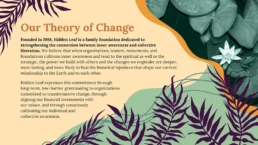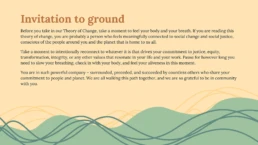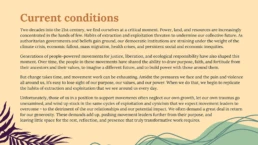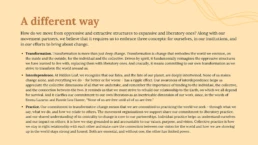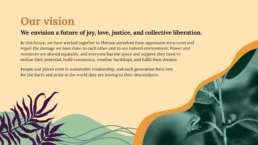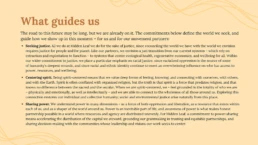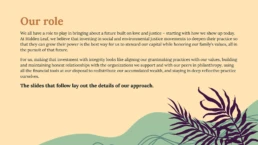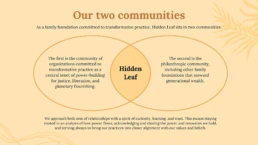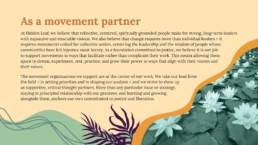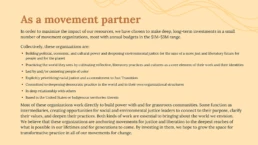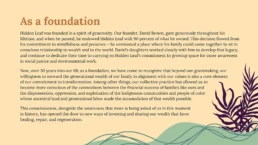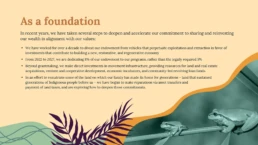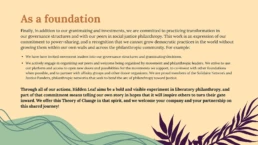Transformative Change
What is Transformative Change?
Transformative social change engages inner awareness and personal development practices to enhance the effectiveness of organizations working to build and shift power toward a just and sustainable world for all. This work aspires to create fundamental changes within individuals, organizations, and society as a whole.
By “turning their gaze inward,” more and more social change organizations are developing wise and compassionate leaders, strengthening the health and sustainability of their organizations, forging effective coalitions, growing healthy movements, and cultivating new ways of envisioning our society.
We define “transformative practice” as approaches in organizing and movement building that provide a daily way to embody the change we hope to see within ourselves, our organizations, and our society.
What is Transformative Change?
Transformative social change engages inner awareness and personal development practices to enhance the effectiveness of organizations working to build and shift power toward a just and sustainable world for all. This work aspires to create fundamental changes within individuals, organizations, and society as a whole. By “turning their gaze inward,” more and more social change organizations are developing wise and compassionate leaders, strengthening the health and sustainability of their organizations, forging effective coalitions, growing healthy movements, and cultivating new ways of envisioning our society. We define “transformative practice” as approaches in organizing and movement building that provide a daily way to embody the change we hope to see within ourselves, our organizations, and our society.
Some practices are deeply embedded in traditional and Indigenous pathways while others are built from newer spiritual approaches, psychological wisdom, and organizational development strategies. Awareness practices currently being used in movement organizations include:
Mindfulness and self-reflection Embodiment practices, including somatics Deep listening, dialogue, and other interpersonal communication tools Democratic approaches in staffing and governance Indigenous and cultural practices Ceremony and rituals based on spiritual or cultural traditions Peer coaching Self-care and personal ecology; organizational sustainability Courageous conversations Compassionate agitation Visioning retreats Political education
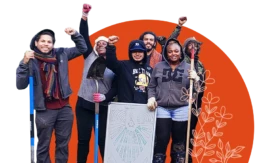
Photo: Climate Justice Alliance
Incorporating inner awareness into our work lives, reconnecting regularly with our values and motivations, and creating alignment between inner and outer work can result in radical transformation for those dedicated to effecting social change.
Some practices are deeply embedded in traditional and Indigenous pathways while others are built from newer spiritual approaches, psychological wisdom, and organizational development strategies. Awareness practices currently being used in movement organizations include:
Mindfulness and self-reflection Embodiment practices, including somatics Deep listening, dialogue, and other interpersonal communication tools Democratic approaches in staffing and governance Indigenous and cultural practices Ceremony and rituals based on spiritual or cultural traditions Peer coaching Self-care and personal ecology; organizational sustainability Courageous conversations Compassionate agitation Visioning retreats Political education

Photo: Climate Justice Alliance
Incorporating inner awareness into our work lives, reconnecting regularly with our values and motivations, and creating alignment between inner and outer work can result in radical transformation for those dedicated to effecting social change.

Individual Level
We see the need for healed, spiritually grounded people who can become strong, resilient leaders with expansive and enactable visions. Grounded leaders are crucial and compelling to others to join and stay in movements. Recognizing and attending to the whole person within organizations helps cultivate these individuals.

Organizational Level
We recognize that individual leaders cannot just be in practice by themselves. Whole organizations must practice in community to build the society we seek. Collective practice creates sustainability, coherence, and power within organizations.

Movement Level
The field is “practicing the world we seek.” This means practicing a new, transformed society that holds all people and creatures as whole and intact, and that respects our planet. “Practicing the world we seek” (relationally, ecologically, spiritually, economically, and democratically) is a signal of depth. It helps build alliances and coalitions who are stepping into bolder visions that bring together both likely and unlikely partners in service of liberation.

Individual Level
We see the need for healed, spiritually grounded people who can become strong, resilient leaders with expansive and enactable visions. Grounded leaders are crucial and compelling to others to join and stay in movements. Recognizing and attending to the whole person within organizations helps cultivate these individuals.

Organizational Level
We recognize that individual leaders cannot just be in practice by themselves. Whole organizations must practice in community to build the society we seek. Collective practice creates sustainability, coherence, and power within organizations.

Movement Level
The field is “practicing the world we seek.” This means practicing a new, transformed society that holds all people and creatures as whole and intact, and that respects our planet. “Practicing the world we seek” (relationally, ecologically, spiritually, economically, and democratically) is a signal of depth. It helps build alliances and coalitions who are stepping into bolder visions that bring together both likely and unlikely partners in service of liberation.
Photo: Asian Pacific Environmental Network
What is Transformative Organizing?
The majority of frontline organizations that Hidden Leaf supports engage in transformative community organizing. The intermediaries we fund build these organizations’ holistic practices to make that organizing model even more effective. Community organizing, in and of itself, can be a transformative practice. Organizing is transformative when it:
is rooted in multi-generational base-building strategies, connecting power across a broad set of people, within communities attends to sustainable leadership development to build thriving organizations incorporates personal transformation, healing, and growth as core to its model deeply engages systems change campaigns, shifting broader conditions toward community liberation and self-determination centers movement building as core to connecting a broader set of communities and issues
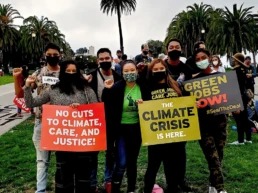
Photo: Asian Pacific Environmental Network
What is Transformative Organizing?
The majority of frontline organizations that Hidden Leaf supports engage in transformative community organizing. The intermediaries we fund build these organizations’ holistic practices to make that organizing model even more effective. Community organizing, in and of itself, can be a transformative practice. Organizing is transformative when it:
is rooted in multi-generational base-building strategies, connecting power across a broad set of people, within communities attends to sustainable leadership development to build thriving organizations incorporates personal transformation, healing, and growth as core to its model deeply engages systems change campaigns, shifting broader conditions toward community liberation and self-determination centers movement building as core to connecting a broader set of communities and issues
Our Theory of Change
We believe that when organizations, leaders, movements, and foundations cultivate inner awareness and tend to the spiritual as well as the strategic, the power we build with others and the changes we engender are deeper, more lasting, and more likely to heal the historical injustices that shape our current relationship to the Earth and to each other. Hidden Leaf expresses this commitment through long-term, low-barrier grantmaking to organizations committed to transformative change, through aligning our financial investments with our values, and through consciously cultivating our individual and collective awareness.
Our Theory of Change
We believe that when organizations, leaders, movements, and foundations cultivate inner awareness and tend to the spiritual as well as the strategic, the power we build with others and the changes we engender are deeper, more lasting, and more likely to heal the historical injustices that shape our current relationship to the Earth and to each other. Hidden Leaf expresses this commitment through long-term, low-barrier grantmaking to organizations committed to transformative change, through aligning our financial investments with our values, and through consciously cultivating our individual and collective awareness.
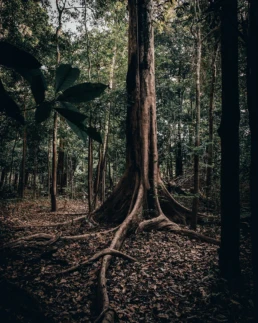
What spirit-centered means to us
We at Hidden Leaf are learning how to center spirit in our work and relationships. For us, being spirit-centered is about restoring our deep humanity, about showing up with the entirety of ourselves and accepting complexity in the wholeness of others. Spirit is not religion; it knows no difference between the sacred and the secular. Spirit is about remembering the truth of our interconnectedness across generations. We boldly face and honor our past and hold dear our future descendants as we act today. We are striving to understand spirit both intellectually and experientially. This requires us to develop embodied practices that help us commune with ourselves and others. Perhaps spirit is in that ember of our humanity that yearns for, fights for, works for justice and love for all. And perhaps spirit is as simple as naming and embracing that which is essential, but not always evident.
We at Hidden Leaf are learning how to center spirit in our work and relationships. For us, being spirit-centered is about restoring our deep humanity, about showing up with the entirety of ourselves and accepting complexity in the wholeness of others. Spirit is not religion; it knows no difference between the sacred and the secular. Spirit is about remembering the truth of our interconnectedness across generations. We boldly face and honor our past and hold dear our future descendants as we act today. We are striving to understand spirit both intellectually and experientially. This requires us to develop embodied practices that help us commune with ourselves and others. Perhaps spirit is in that ember of our humanity that yearns for, fights for, works for justice and love for all. And perhaps spirit is as simple as naming and embracing that which is essential, but not always evident.


